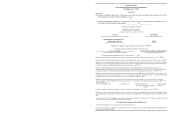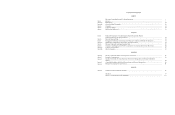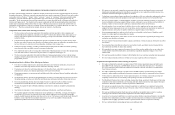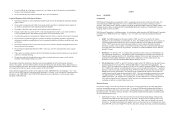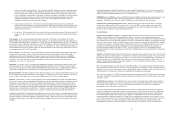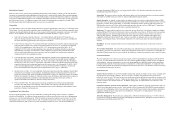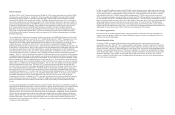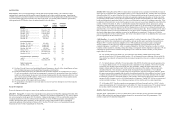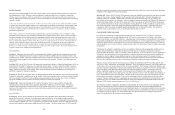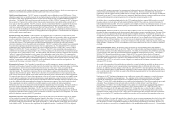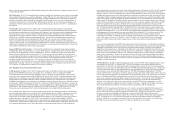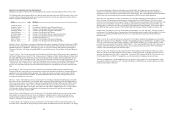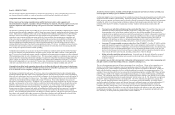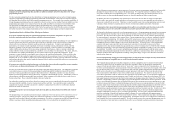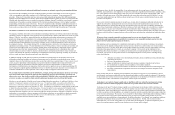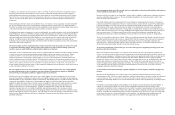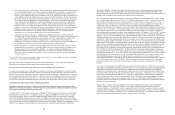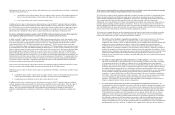Dish Network 2012 Annual Report Download - page 13
Download and view the complete annual report
Please find page 13 of the 2012 Dish Network annual report below. You can navigate through the pages in the report by either clicking on the pages listed below, or by using the keyword search tool below to find specific information within the annual report.14
14
require us to comply with all regulatory obligations imposed upon broadcast licensees, which in certain respects are
subject to more burdensome regulation than subscription television service providers.
Public Interest Requirements. The FCC imposes certain public interest obligations on our DBS licenses. These
obligations require us to set aside four percent of our channel capacity exclusively for noncommercial programming
for which we must charge programmers below-cost rates and for which we may not impose additional charges on
subscribers. The Satellite Television Extension and Localism Act of 2010 (“STELA”) requires the FCC to decrease
this set-aside to 3.5 percent for satellite carriers who provide retransmission of state public affairs networks in 15
states and are otherwise qualified. The FCC, however, has not yet determined whether we qualify for this decrease
in set-aside. The obligation to provide noncommercial programming may displace programming for which we
could earn commercial rates and could adversely affect our financial results. We cannot be sure that, if the FCC
were to review our methodology for processing public interest carriage requests, computing the channel capacity we
must set aside or determining the rates that we charge public interest programmers, it would find them in compliance
with the public interest requirements.
Separate Security, Plug and Play. Cable companies are required by law to separate the security from the other
functionality of their set-top boxes. Set-top boxes used by DBS providers are not currently subject to such separate
security requirement. However, the FCC is considering a possible expansion of that requirement to DBS set-top
boxes. Also, the FCC adopted the so-called “plug and play” standard for compatibility between digital television
sets and cable systems. That standard was developed through negotiations involving the cable and consumer
electronics industries, but not the satellite television industry. The FCC’s adoption of the standard was accompanied
by certain rules regarding copy protection measures that were applicable to us. We appealed the FCC’s decision
regarding the copy protection measures to the U.S. Court of Appeals for the D.C. Circuit (“D.C. Circuit”) and on
January 15, 2013 the D.C. Circuit vacated the FCC’s decision. The FCC is also considering various proposals to
establish two-way digital cable “plug and play” rules. That proceeding also asks about means to incorporate all pay-
TV providers into its “plug and play” rules. The cable industry and consumer electronics companies have reached a
“tru2way” commercial arrangement to resolve many of the outstanding issues in this docket. We cannot predict
whether the FCC will impose rules on our DBS operations that are based on cable system architectures or the private
cable/consumer electronics tru2way commercial arrangement. Complying with the separate security and other “plug
and play” requirements would require potentially costly modifications to our set-top boxes and operations. We
cannot predict the timing or outcome of this FCC proceeding.
Retransmission Consent. The Copyright Act generally gives satellite companies a statutory copyright license to
retransmit local broadcast channels by satellite back into the market from which they originated, subject to obtaining
the retransmission consent of local network stations that do not elect “must carry” status, as required by the
Communications Act. If we fail to reach retransmission consent agreements with such broadcasters, we cannot
carry their signals. This could have an adverse effect on our strategy to compete with cable and other satellite
companies that provide local signals. While we have been able to reach retransmission consent agreements with
most of these local network stations, there remain stations with which we have not been able to reach an agreement.
We cannot be sure that we will secure these agreements or that we will secure new agreements on acceptable terms,
or at all, upon the expiration of our current retransmission consent agreements, some of which are short-term. In
recent years, national broadcasters have used their ownership of certain local broadcast stations to attempt to require
us to carry additional cable programming in exchange for retransmission consent of their local broadcast stations.
These requirements may place constraints on available capacity on our satellites for other programming.
Furthermore, the rates we are charged for retransmitting local channels have been increasing. We may be unable to
pass these increased programming costs on to our customers, which could have a material adverse effect on our
financial condition and results of operations. The FCC is currently considering changes to its rules governing
retransmission consent disputes that are designed to provide more guidance to the negotiating parties on good-faith
negotiation requirements and to improve notice to consumers in advance of possible service disruptions. We cannot
predict the timing or outcome of this FCC proceeding.
Digital HD Carry-One, Carry-All Requirement. To provide any full-power local broadcast signal in any market,
we are required to retransmit all qualifying broadcast signals in that market (“carry-one, carry-all”). The FCC
adopted digital carriage rules that required DBS providers to phase in carry-one, carry-all obligations with respect to
the carriage of full-power broadcasters’ HD signals by February 17, 2013 in markets in which they elect to provide
local channels in HD. We have met this requirement in all applicable markets. In addition, STELA has imposed
15
15
accelerated HD carriage requirements for noncommercial educational stations on DBS providers that do not have a
certain contractual relationship with a certain number of such stations. We have entered into such contractual
relationships with the requisite number of PBS stations to comply with the requirements. The carriage of additional
HD signals on our pay-TV service could cause us to experience significant capacity constraints and prevent us from
carrying additional popular national programs and/or carrying those national programs in HD.
In addition, there is a pending rulemaking before the FCC regarding whether to require DBS providers to carry all
broadcast stations in a local market in both standard definition and HD if they carry any station in that market in
both standard definition and HD. If we were required to carry multiple versions of each broadcast station, we would
have to dedicate more of our finite satellite capacity to each broadcast station. We cannot predict the outcome or
timing of that rulemaking process.
Distant Signals. Pursuant to STELA, we have been able to obtain a waiver of a court injunction that previously
prevented us from retransmitting certain distant network signals under a statutory copyright license. Because of that
waiver, we may once again provide distant network signals to eligible subscribers. To qualify for that waiver, we
are required to provide local service in all 210 local markets in the U.S. on an ongoing basis. This condition poses a
significant strain on our capacity. Moreover, we may lose that waiver if we are found to have failed to provide local
service in any of the 210 local markets. If we lose the waiver, the injunction could be reinstated. Furthermore,
depending on the severity of the failure, we may also be subject to other sanctions, which may include, among other
things, damages. Pursuant to STELA, our compliance with certain conditions of the waiver is subject to continued
oversight.
Cable Act and Program Access. We purchase a large percentage of our programming from cable-affiliated
programmers. Pursuant to the Cable Act of 1992 (“Cable Act”), cable providers had been prohibited from entering
into exclusive contracts with cable-affiliated programmers. The Cable Act directed that this prohibition expire after
a certain period of time unless the FCC determined that the prohibition continued to be necessary. On October 5,
2012, the FCC allowed this prohibition to expire. While the FCC has issued a Further Notice of Proposed
Rulemaking aimed at serving some of the same objectives as the prohibition, there can be no assurances that such
protections will be adopted or be as effective as the prohibition if they are adopted. In the event this decision is
reconsidered by the FCC or reviewed by a court of appeals, we cannot predict the timing or outcome of any
subsequent FCC decision.
As a result of the expiration of this prohibition on exclusivity, we may be limited in our ability to obtain access at
all, or on nondiscriminatory terms, to programming from programmers that are affiliated with cable system
operators. In addition, any other changes in the Cable Act, and/or the FCC’s rules that implement the Cable Act,
that currently limit the ability of cable-affiliated programmers to discriminate against competing businesses such as
ours, could adversely affect our ability to acquire cable-affiliated programming at all or to acquire programming on
non-discriminatory terms.
Furthermore, the FCC had imposed program access conditions on certain cable companies as a result of mergers,
consolidations or affiliations with programmers. The expiration of the exclusivity prohibition in the Cable Act
triggered the termination of certain program access conditions that the FCC had imposed on Liberty Media
(“Liberty”). In July 2012, similar program access conditions that had applied to Time-Warner expired as previously
scheduled. These developments may adversely affect our ability to obtain Liberty’s and Time-Warner’s
programming, or to obtain it on non-discriminatory terms. In the case of certain types of programming affiliated
with Comcast through its venture with General Electric, NBCUniversal Media, LLC (“NBCUniversal”), the
prohibition on exclusivity will still apply until January 2018. During that time, we have the right to subject the
terms of access to NBCUniversal’s programming to binding arbitration if we and the programmer cannot reach
agreement on terms, subject to FCC review. There can be no assurance that this procedure will result in favorable
terms for us or that the FCC conditions that establish this procedure will be prevented from expiring on their own
terms.
In addition, affiliates of certain cable providers have denied us access to sports programming they feed to their cable
systems terrestrially, rather than by satellite. The FCC has held that new denials of such service are unfair if they
have the purpose or effect of significantly hindering us from providing programming to consumers. However, we
cannot be sure that we can prevail in a complaint related to such programming and gain access to it. Our continuing


